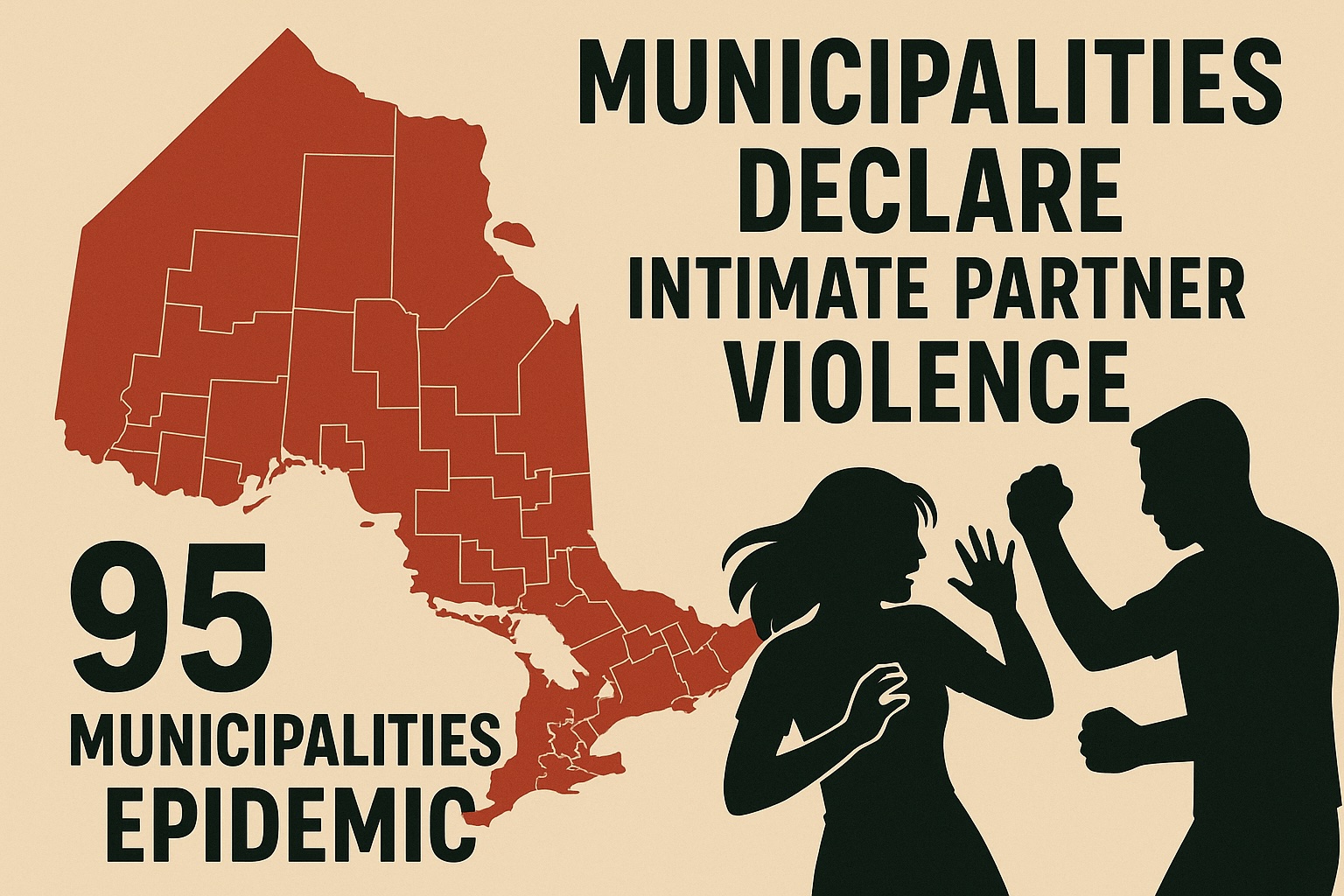📰 95 Ontario Municipalities Declare Intimate Partner Violence an Epidemic
Over 95 Ontario municipalities, including Ottawa, Sudbury, and Toronto, have declared intimate partner violence (IPV) an epidemic, pressuring the province to act.

Across Ontario, municipalities are stepping up where the province has stalled. By mid-2025, at least 95 municipalities — from Canada’s largest cities to small northern towns — have passed motions declaring intimate partner violence (IPV) an epidemic.
From Toronto’s city hall to Sudbury’s council chambers, local leaders are making bold public statements: IPV is not just a private issue but a public health and safety crisis that requires urgent action.
These declarations carry no direct legal force, but their impact is profound: they validate survivors, raise awareness, and put mounting pressure on the Ontario government to formally recognize IPV as the epidemic it is.
Why Municipal Declarations Matter
Public Solidarity with Survivors
Survivors often feel silenced or stigmatized. A public declaration tells them: you are seen, you are heard, and your community stands with you.Local Policy Development
Municipalities can use declarations as frameworks to:Strengthen housing and shelter policies.
Expand local public awareness campaigns.
Build partnerships with police, schools, and nonprofits.
Political Pressure
Every declaration puts added pressure on provincial and federal governments to follow suit with funding and systemic reform.
Local Leadership in Action
Ottawa
City council declared IPV an epidemic, emphasizing its devastating impact on women and children, and calling for expanded shelter capacity.
Sudbury
A sharp 63% rise in IPV-related calls to police fueled its declaration, underscoring the urgency of the crisis in northern Ontario communities.
Toronto
Canada’s largest city tied its declaration to budget allocations for housing and shelter expansion, signaling a direct connection between public recognition and resource commitments.
Smaller Communities
From Thunder Bay to Cornwall, smaller municipalities joined in, proving IPV is not confined to major urban centers — it affects every region, rural and urban alike.
Impact on Survivors
Survivors report that municipal declarations:
Provide a sense of validation and visibility, reducing stigma.
Strengthen local public awareness campaigns that inform communities about resources.
Drive fundraising and partnerships, enabling shelters and advocacy groups to expand services.
Even though the declarations are symbolic, they represent a cultural shift: IPV is no longer hidden or minimized at the local level.
The Provincial Gap
While municipalities are acting, the Ontario government has resisted declaring IPV an epidemic. Provincial officials point to existing funding for gender-based violence programs, but critics argue:
Funding hasn’t kept up with rising demand.
Shelters continue to turn away survivors nightly.
Without formal recognition, systemic change remains slow.
This policy gap between municipalities and the province is widening trust issues. Communities see their local governments taking action, while provincial leaders appear hesitant to acknowledge the full scope of the crisis.
Why This Matters for SEO and Awareness
There is strong search demand around terms like:
“Ontario IPV epidemic declaration”
“municipal IPV epidemic motion Ontario”
“Toronto domestic violence declaration”.
Publishing long, informative content ensures visibility while positioning your platform as a trusted authority on domestic violence advocacy in Ontario.
Conclusion
Ontario’s municipalities are sending a clear, united message: intimate partner violence is an epidemic. Their declarations are more than symbolic; they are public commitments to survivors and building blocks for stronger policies.
The provincial government may resist, but the momentum is undeniable. With 95 municipalities on board and counting, local leaders are laying the groundwork for systemic change — whether the province is ready to admit it or not.
FAQs
1. How many municipalities in Ontario declared IPV an epidemic?
At least 95 as of mid-2025.
2. Which major cities joined the declaration?
Toronto, Ottawa, and Sudbury, alongside many smaller communities.
3. Why are municipalities making these declarations?
To validate survivors, raise awareness, and pressure the provincial government.
4. Does a municipal declaration change laws?
No — but it strengthens advocacy, guides policy, and fuels public recognition.
5. How has the province responded?
The Ontario government has so far refused to declare IPV an epidemic provincially.
